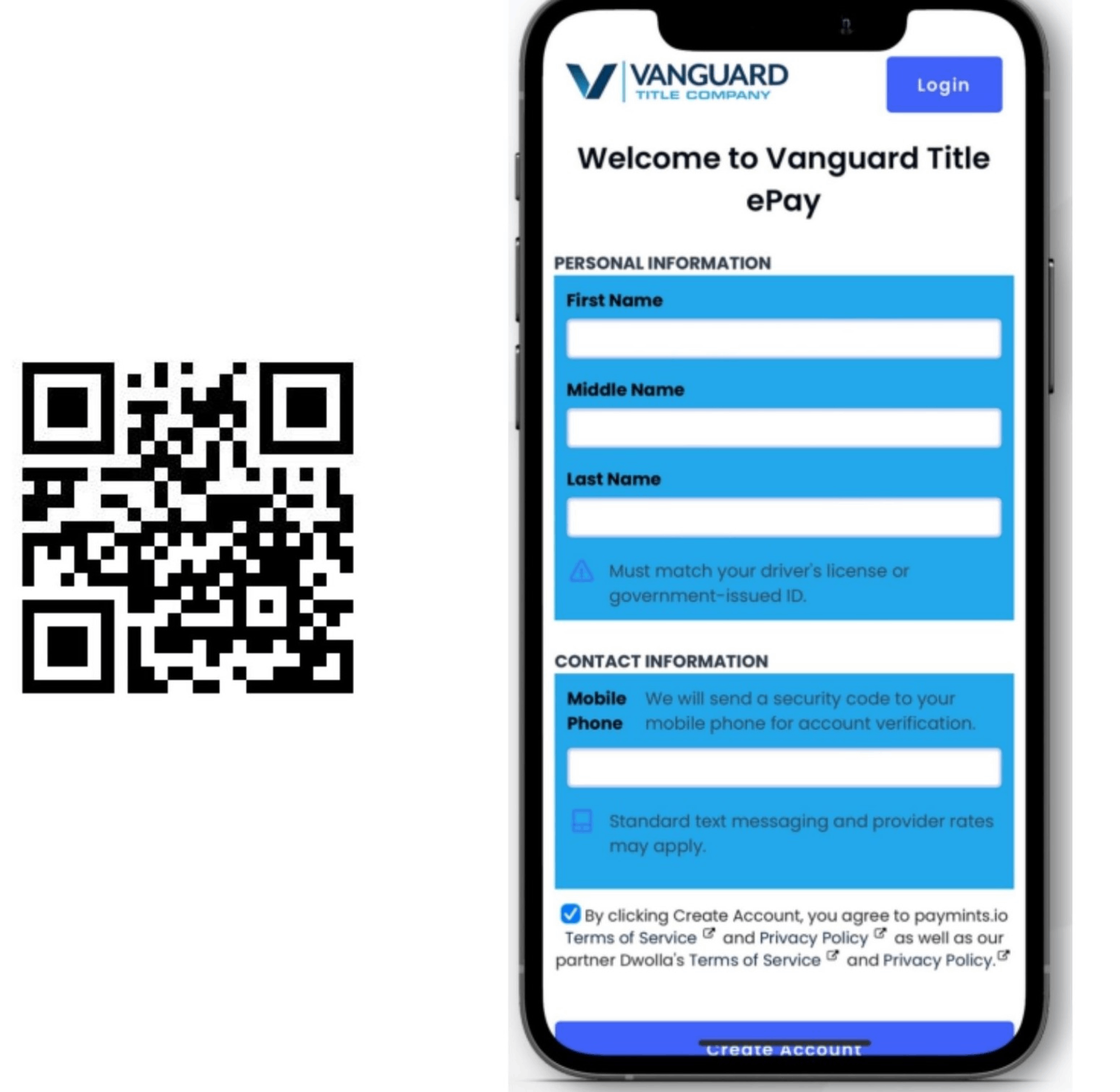Earnest Money Deposit
 | “Skip The Bank”
| “Skip The Bank”
Paper checks and wire transfers can finally be a thing of the past with Vanguard Title ePay! Now, delivering funds for your next real estate transaction is easier, safer, and quicker than ever.
See what Vanguard Title ePay offers:
- Fully Electronic, Encrypted, & Secure
- Initiate a Transfer within 90 Seconds
- Connect to Any Financial Institution in the US
- Never Share Routing or Account Numbers
- Stay Informed with Email Notifications
- Receive Refunds
- Accessible 24/7
It’s Time to Ditch Paper Checks!!

 | When Submitting Your Earnest Money Deposit, We Have Options For You!
| When Submitting Your Earnest Money Deposit, We Have Options For You!
WIRES
- Request / Pay From Anywhere
- Protects Sensitive Information
- Automated Receipts
- Full ID Verification
- Funds Verified
- Earnest Money Deposit
- Cash to Close for Refinances
- NO Extended Waiting Period for Cleared Funds
VANGUARD TITLE EPAY
- Request / Pay From Anywhere
- Protects Sensitive Information
- Automated Receipts
- Full ID Verification
- Funds Verified
- Earnest Money Deposit
- Cash to Close for Refinances
- NO Extended Waiting Period for Cleared Funds
CHECKS
- Request / Pay From Anywhere
- Protects Sensitive Information
- Automated Receipts
- Full ID Verification
- Funds Verified
- Earnest Money Deposit
- Cash to Close for Refinances
- NO Extended Waiting Period for Cleared Funds
*All incoming funds must be received and cleared prior to closing. All closing funds must be “collected funds” prior to disbursement. THERE ARE NO EXCEPTIONS.
 | Vanguard Title Epay
| Vanguard Title Epay












 | Other Types Of Deposits
| Other Types Of Deposits
If sending money by WIRE:
Vanguard Title wire instructions are sent ONLY via our secured portal called CertifID. Upon receipt of any wire instructions, please always contact our office at 248-751-1000 to verbally confirm the instructions before initiating your wire.
We use CertifID to help prevent E-mail and Internet-related fraud schemes which have become increasingly prevalent and more sophisticated in recent years, affecting customers of financial institutions across the United States . These scams are often perpetrated by criminals who compromise the e-mail accounts of unsuspecting individuals and businesses, and then use those e-mail accounts to initiate unauthorized funds transfer requests.
If sending PAPER CHECKS:
Paper checks can be mailed or dropped off in person at our Headquarters, 2100 Coe Court, Auburn Hills, MI 48326.
Please allow 7-10 for delivery time.
HOW TO PROTECT YOURSELF FROM HACKERS:
- Be careful with what information you share online or on social media. By openly sharing things like pet names, schools you attended, links to family members, and your birthday, you can give a scammer all the information they need to guess your password or answer your security questions.
- When purchasing or selling a home be careful not to share online as hackers are looking for this specific activity.
- Don’t click on anything in an unsolicited email or text message asking you to update or verify account information. Look up the company’s phone number on your own (don’t use the one a potential scammer is providing), and call the company to ask if the request is legitimate.
- Carefully examine the email address, URL, and spelling used in any correspondence, you should be able to see what email address it’s coming from by hovering over the name in the sender area. Scammers use slight differences to trick your eye and gain your trust.
- Be careful what you download. Never open an email attachment from someone you don’t know and be wary of email attachments forwarded to you.
- Set up two-factor (or multi-factor) authentication on any account that allows it, and never disable it.
- Verify payment and purchase requests in person if possible or by calling the person to make sure it is legitimate. You should verify any change in account number or payment procedures with the actual person making the request.
- Be especially wary if the requestor is pressing you to act quickly! This is a tactic that fraudsters use to get you to move quickly and scare you into sending money.
Additional information and resources on business email compromise can be found at: www.fbi.gov/bec
 | CLOSING LOCATIONS
| CLOSING LOCATIONS
Headquarters
Auburn Hills, MI 48326
Clarkston Closing Location
Clarkston, MI 48346
Livonia Closing Location
Livonia, MI 48152
Shelby Township Closing Location
Shelby Township, MI 48317
